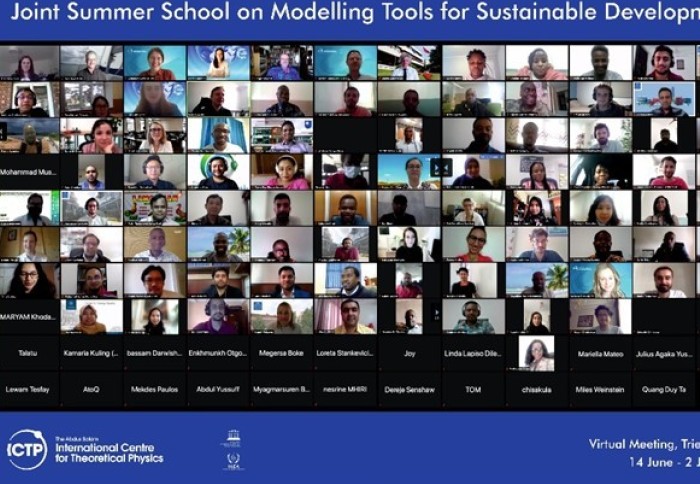Imperial runs energy modelling course to support sustainable development goals

Imperial researchers help develop an energy modelling course for the ICTP Summer School, run by Climate Compatible Growth (CCG) with other partners.
The Energy Systems Modelling team at the Sustainable Gas Institute have developed an energy systems modelling course as part of the Climate Compatible Growth (CCG) programme’s involvement with the ICTP Joint Summer School on Modelling Tools for Sustainable Development, which took place from 14 June to 2 July 2021.
The Climate Compatible Growth (CCG) programme is a £38m UK government-funded research initiative which aims to help developing countries achieve low carbon development, open new markets, and support the Sustainable Development Goals (SDGs). Imperial College London is one of the research partners along with other UK universities.
The summer school is part of a wider capacity building programme of regional training events around the globe. It was run by CCG and hosted virtually by the Abdus Salam International Centre for Theoretical Physics (ICTP) in Trieste, Italy, in partnership with other international organisations. Over 112 participants from more than 30 countries signed in, with an even split of participants from academia and the public sector.
Ms Pooya Hoseinpoori, a Research Assistant in the Centre for Environmental Policy, explains why the training is important: “The Summer School’s main aim is to help build capacity in partner countries to address the fundamentals of planning for climate compatible growth. Energy analysis is a valuable tool for conducting energy system planning analyses to inform policy decisions, for example, in helping to develop roadmaps for electrifying households, increasing accessibility and affordability of energy.”
The Institute worked with a team from Loughborough University on the Energy Modelling and Power System Flexibility course, one of the five courses developed for the summer school and open training courses were held online via MS Team and Gathertown.
The aim of the course was to provide tools to better understand what investments are needed and at what scale in the energy sector to meet demand while meeting energy security, economic development, and environmental goals. The first part of the course focused on investment planning in energy systems using the open source model, OSeMOSYS.
The team also worked with International Renewable Energy Agency (IRENA) to develop training materials for IRENA’s FlexTool model, which is an open source tool for conducting flexibility assessments of the energy system. It provides valuable insights on how to increase the share of renewable energy in the energy system without compromising reliability and energy security.
The tools used in all the training courses are all open source and available on Open University and have been developed by CCG in collaboration with the UN and international organisations. While traditional training and coaching sessions were scheduled during the first week, students used the tools in the second week to create a national case study, prepare a policy note, a poster, and an elevator pitch for a senior policy maker.
“The event provided a great platform to share knowledge and network with participants from different countries. We really hope the students gained experience in data preparation, model building, data entry, and scenario design and use this experience and knowledge to better inform policy making in their countries. There were many interesting discussions with participants from different backgrounds, and it was great to learn about their views on energy transition and sustainable development,” says Pooya.
Several global regional training events are planned later this year. The next event is EMP-A (Energy Modelling Platform for Africa), which will be held virtually at the end of 2021. Applications for this event will open soon, and admission is free. To find out more about the training sessions, subscribe to the CCG programme's newsletter or follow their LinkedIn page.
Article text (excluding photos or graphics) © Imperial College London.
Photos and graphics subject to third party copyright used with permission or © Imperial College London.
Reporter
Zara Qadir
Department of Earth Science & Engineering
Dr Pooya Hoseinpoori
Department of Chemical Engineering